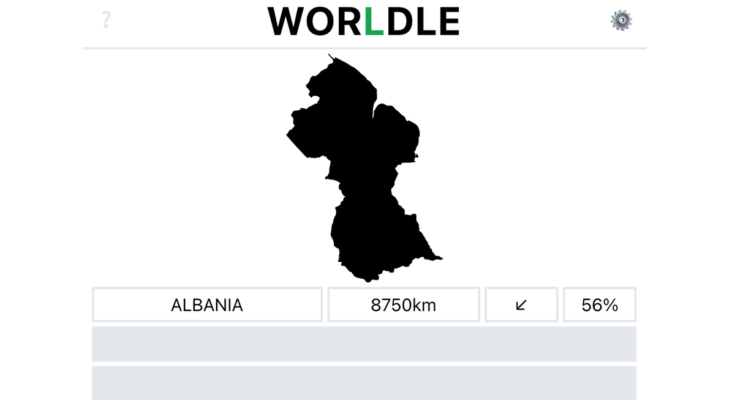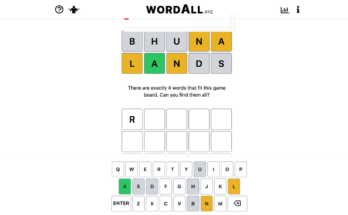
If you were always more into the geography bowl over the spelling bee, you’re in luck. The latest addition to the Wordle-esque turf war is a global challenger called “Worldle.” And chances are excellent this geography-based guessing game will destroy the ego your 25-day Wordle streak has built up.
Not that you should let the threat of a serious challenge deter you. Let it fuel you. Play Worldle every day. Allow it to break you down so a new, better version of you can rise from the ashes, like a phoenix—a phoenix who can actually locate Afghanistan on a map.
What’s the point of Worldle?
Guess the mystery country or region based on its silhouette.
How Worldle works
We assume you clicked on this article because you’re already familiar with—and perhaps bored of—Wordle’s gameplay. (If you’re not, you can refresh yourself on how that game works here.)
Like Wordle, in Worldle you are given six guesses to help you narrow down the correct country. After each guess, you’ll see (1) the distance in kilometers (or miles) that your guess is from the correct location, (2) an arrow pointing in the direction you need to travel to get there, and (3) a proximity percentage of how close you are on a global scale.
For example, say you’re presented with a silhouette of France. If you guess China (no judgment!), you’d be told that you’re 8,042 kilometers away from the correct country, and shown an arrow pointing west to get you guessing in the right cardinal direction.
How to win at Worldle
Go back in time and rectify the American education system. Compared to Wordle, which only requires you to know of the mere existence of different five-letter words, Worldle demands quite a bit more encyclopedic knowledge.
Assuming you don’t immediately recognize the country based on its outline, your best strategy is to triangulate it with whatever knowledge of geography you do possess.
This means you should at the very least begin by narrowing down the correct continent, and then let the distance and directional clues help you get closer and closer to the correct destination. Unfortunately, at a certain point you simply need to know the names of the countries in that region. Yesterday I had narrowed my answer down via Poland, Austria, and Slovakia, but even after the answer was revealed, I knew I never would have guessed it no matter what. (It was Czechia, if you were wondering.)
Why you should play Worldle
Worldle is objectively more impressive to master than Wordle. Far be it from me to pit two strong games against each other, but the advantage of Worldle over Wordle is the potential to actually learn or refresh real-world knowledge. I know the geography I learned in my American schooling is pitiful compared to other curriculums around the world. Maybe Worldle is a small act of resistance, an act of resilience, an act of self-improvement that simultaneously betters the international reputation of all Americans. Or maybe it’s just a fun companion game to Wordle.
Final thoughts
If you find Worldle too easy, you can ramp up the difficulty by choosing to randomly rotate the image of the country, or even hide it entirely and going solely off the directional clues. Play here.
Although the gameplay clearly takes place in the Wordle-verse, Worldle offers an entirely different sort of challenge. If it fails to fill the Wordle-shaped hole in your heart, there are other Wordle alternatives to try instead.



